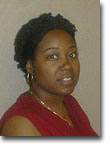The February 2 edition of Science profiles the research of University of Chicago oncologist Olufunmilayo "Funmi" Olopade. As a medical resident at Cook County Hospital in Chicago, she noticed that many of her breast cancer patients were black, poor and unusually young, just as her patients had been in her native Nigeria. Statistics show that African American women not only tend to get breast cancer at an earlier age than Caucasian women, but their survival rate is lower. Recent studies suggest that this is due, at least in part, to genetic differences between the tumors carried by African American women.
Last June, for example, a team of U.S. and Canadian researchers published results in The Journal of the American Medical Association from the Carolina Breast Cancer Study, which examined the prevalence of different breast cancer subtypes among 496 breast cancer patients. The researchers were particularly interested in a high-risk "basal-like subtype." These "triple-negative" tumors--negative for estrogen receptors, progesterone receptors, and human epidermal growth factor receptor-2 (HER2)--tend to spread quickly. And because they don't respond to targeted new drugs, they can be hit only with traditional chemotherapy.Olopade has turned to studying breast cancer in African women to try to understand the racial disparities in breast cancer tumor genetics and prognosis.
Triple-negative tumors, it turns out, are also unusually prevalent in young African-American women. Of the 97 premenopausal African Americans in the Carolina Breast Cancer study, 39% had this subtype. Among postmenopausal African Americans, the number was 14%, whereas in the 300 non-African Americans, regardless of age, it held steady at 16%.
After confirming that fewer than 10% of the women in a group of patients from Nigeria had inherited a BRCA mutation, Olopade found that a startling 77% of 378 samples from Nigeria and Senegal were ER-negative. This contrasts with 39% in African Americans and 23% in Caucasians. Although many of the African women were young, and younger breast cancer patients are more prone to have ER-negative tumors, the numbers were still off the charts. "This just blew us away," she says. Those results, which Olopade and her colleagues presented at a cancer meeting in 2005 and are readying for publication, led her to believe that aggressive breast cancers in blacks are driven by an interplay of genes and environment.Some critics are concerned that Olopade's research could lead to racial stereotyping and draw attention away from disparities in access to medical treatment.
Olopade the straight talker responds forcefully to such criticisms, arguing that the aggressive disease she so often sees is not due only to poverty and lack of access to care. And she has strong defenders, especially among colleagues such as Rebbeck, who has collaborated with her for many years. "She's very outspoken and forceful and direct in a good way," he says.In 2005, she won a MacArthur foundation "genius" grant for her work "translating findings on the molecular genetics of breast cancer in African and African-American women into innovative clinical practices in the United States and abroad". Her lab also studies the potential role of stress and other environmental factors on breast cancer susceptibility.
Article (subscription required): Probing the Roots of Race and Cancer, Science 315 (5812): 592-594 (2007)
Related Links
- University of Chicago Hospitals Profile: Olunfunmilayo I. Olopade, MD, FACP; Professor of Medicine and Human Genetics; Director, Cancer Risk Clinic
- University of Chicago Department of Human Genetics Profile
- University of Chicago Faculty of Medicine Profile
- MacArthur Foundation Fellow Profile
- Breast Cancer Research Foundation Profile
- Hall & Olopade. Disparities in genetic testing: Thinking outside the BRCA box. J. Clin. Oncol. 24: 2197-2203 (2006) (subscription required for full article)
- Olopade et al. Disparities in cancer care: a worldwide perspective and roadmap for change. J. Clin Oncol. 24:2135-2136 (2006) (subscription required)
- Nanda et al. Genetic Testing in an ethnically diverse cohort of high-risk women: a comparative analysis of BRCA1 and BRCA2 mutations in American families of European and African ancestry. JAMA 294: 1925-1933 (2005) (free registration required)
- Hall & Olopade. Confronting genetic testing disparities: Knowledge is power. JAMA 293: 1783-1785 (2005) (free reg. required)
- ScienceDaily: New Clue to Racial Disparity in Breast Cancer Survival Rates (an extension of Olopade's findings by scientists at Children's Hospital in Boston)








